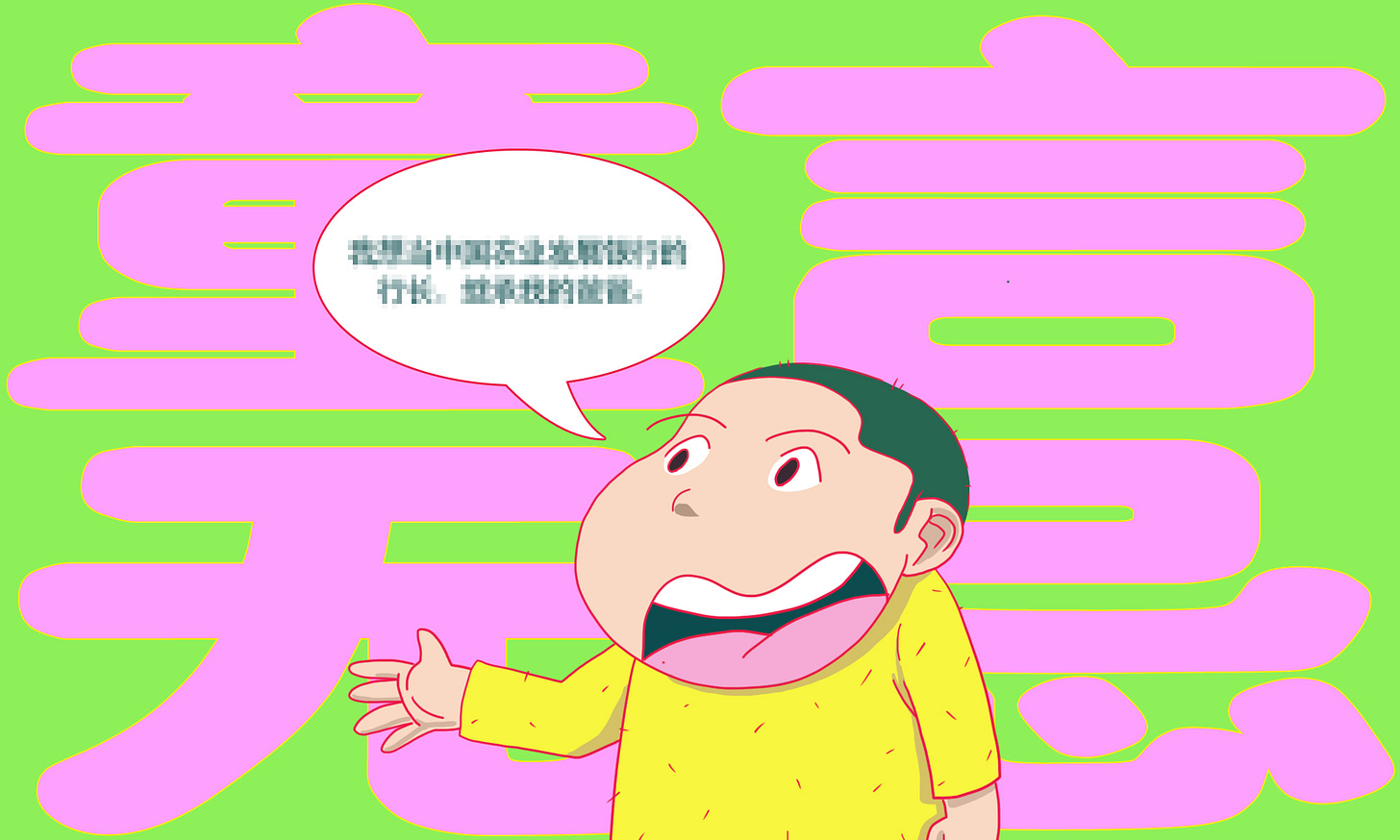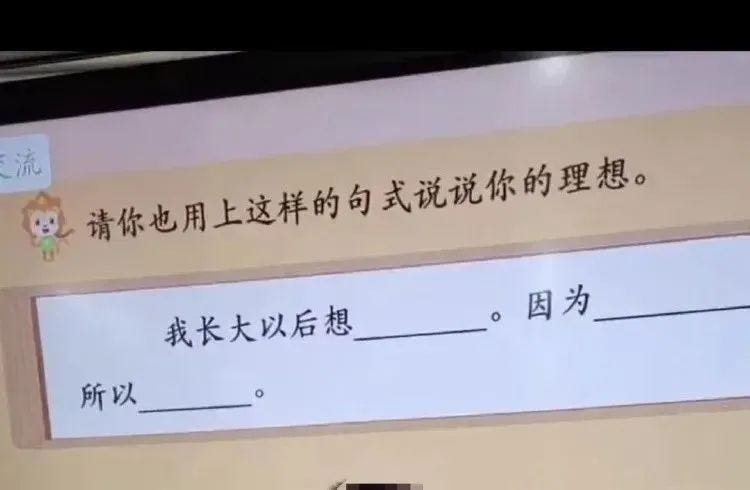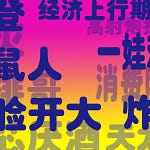Welcome to RealTime Mandarin—a multimedia resource to immerse you in the latest Chinese language trends, inspire you to practice and improve your Mandarin every week, and empower you to communicate with confidence.
Subscribe now to get the next issue straight to your inbox!
On April 3, a video of a primary school student speaking in class sparked heated discussions online.
In the video, the boy talks earnestly about his dream (理想) in a speaking exercise in class:
“I want to succeed my father to become the president of the Agricultural Development Bank of China. Because my grandfather was the president of the bank and my mother is the vice president. I want to inherit our family assets.”
我想当中国农业发展银行的行长,继承我的爸爸。因为我的爷爷是中国农业发展银行的行长,我的妈妈是中国农业发展银行副行长,所以我想继承我们的家产。
The video was posted on social media by his teacher and went viral.
Reactions online, while not critical of the boy directly who was innocently speaking based on an understanding of his world, focussed on how the assets of Agricultural Development Bank (ADB), as a state-owned company, belonged to the state, not a family.
The online attention led to the bank commenting on what the boy said, releasing a statement confirming some details:
The child is the son of a branch president of the bank. His grandfather was an employee of ADB, and has been retired for more than 20 years. His mother is an ordinary employee.
支行行长的小孩,爷爷是农发行职工,退休已经二十多年,母亲是普通科技干部。
The bank also said it was investigating further but gave no more information.
The boy is believed to be the son of the head of a branch of ADB in Xuancheng (宣城), Anhui Province.
Most comments online pointed to how the boy had unintentionally and innocently spoken the truth:
Children simply speak their mind. I think what the boy inadvertently said may not be accurate, but it's generally true. [1]
童言无忌。我觉得小孩子无意中说出来的信息,不一定精确,但大致可信。
It's the truth of how nepotism is seen as pervasive in China's state sector. With powerful family networks still playing a dominant role in state-owned companies such as ADB:
In some families, there are three generations of bankers, three generations of tobacco company owners, or three generations of railway company owners, but of course in others, there are three generations of migrant workers and three generations of delivery boys. Such is the reality. [1]
三代银行人 三代烟草人 三代铁路人,当然还有三代农民工 三代外卖员,现实就是这样的。 [1]
Nepotism in China is nothing new.
A phrase more than 2,000 years-old was quoted in media discussions, as a reminder of how the uneven distribution of power and wealth is a millennia-old issue in China:
Are kings and nobles given their high status by birth?
王侯将相,宁有种乎?
This phrase is attributed to an army officer, Chen Sheng 陈胜, who was alive during the Qin dynasty.
Soon after the death of first emperor of the Qin (Qin Shihuang 秦始皇) in 210 BC, Chen called for change, rejecting the harsh and inhumane system of the time. This led to what would become known as the Dazexiang Uprising (大泽乡起义) one year later.
Although the uprising was unsuccessful, that phrase has stuck. In modern Chinese it’s used to call out nepotism, feudalism, and privilege by birth.
And this is why the innocent words of a young boy struck such a chord. It underlines a bigger issue in modern society, and one reason why young people in China are said to be "unwilling to take off the long gown of Kong Yiji" (“孔乙己们”不愿脱下长衫): because there’s no point if opportunity, power, and wealth, are held in the hands of the few.
The “long gown of Kong Yiji” is a phrase we've discussed before in this newsletter. Kong Yiji is the character of Lu Xun’s short story of the same name. Kong Yiji is a metaphor for the corrupt and crumbling Qing empire. In modern Chinese, Kong Yiji refers to highly educated youngsters who are unable or unwilling to find work.
The language used in online discussions about the young boy in Anhui this week is full of puns, plays on words, and rhyming phrases.
Here are three of our favourites:
“Some people are born into privilege, while others are born to be workhorse” (有些人生来就在罗马,有些人祖传就是牛马).
The words for “Rome” and “workhorse” rhyme and have the character for horse at the end.
"Passing debt from one generation to the next" (贷贷相传).
A play on the character for "generation" (代) which sounds the same as "debt" (贷).
“Cows give birth to cows, sheep to sheep, and bankers to bankers.” (牛生牛,羊生羊,行长的儿子当行长).
The characters for “sheep” (羊) and "president of a bank" (行长) rhyme.
So, that's what we are exploring this week!
Favourite Five
1. 世袭 shì xí
hereditary
嘲讽中国共产党的“世袭”制度 - Mocking the hereditary system of the Chinese Communist Party. [1]
Related:
祖传 zǔ chuán - handed down from one’s ancestors
2. 童言无忌 tóng yán wú jì
children simply speak their mind
童言无忌。我觉得小孩子无意中说出来的信息,不一定精确,但大致可信 - Children simply speak their mind. I think what the boy inadvertently said may not be accurate, but it's generally true. [1]
3. 贷贷相传 dài dài xiāng chuán
to pass debt from one generation to the next
难怪有网友无奈地调侃:普通人贷贷相传,银行人代代相传 - No wonder some netizens joke: "Ordinary people pass debt from one generation to the next, while bankers pass their status down through the generations." [4]
Background: A play on words and a pun on the original idiom “passed down from generation to generation” 代代相传. The characters for "loan" and "generations" sound the same in Chinese.
Related:
代代相传 dài dài xiāng chuán - passed down from generation to generation
4. 阶层固化 jiē céng gù huà
stagnant social mobility
这简直就是“阶层固化”的警告 - This is just like a warning against stagnant social mobility. [2]
5. 耳濡目染 ěr rú mù rǎn
to be influenced by what one hears and sees
孩子出生在银行世家,从小耳濡目染,对银行业的了解和感情, 肯定比一般家庭要深要多 - Born into a family of bankers, he has learned a lot about the banking world since childhood, so he is deeply involved and his understanding of it definitely exceeds that of ordinary people. [3]
Consuming the Conversation
Useful words
6. 家产 jiā chǎn
family property/inheritance
我的妈妈是中国农业发展银行副行长,所以我想继承我们的家产 - My mother is the Vice President of the Agricultural Development Bank of China, so I want to inherit our family assets. [1]
7. 牛马 niú mǎ
workhorse
有些人,生来就在罗马,有些人,祖传就是牛马 - Some people are born into privilege, while others are born to be workhorse. [1]
Note: The words for "Rome" (which is a metaphor for privilege), and for "cattle and horses" rhyme in Chinese.
More: We discussed this phrase two weeks ago, where we translated as “overworked and underpaid”.
8. 入局 rù jú
to enter the game/to join the fray
如果没有背景,必须要付出比别人多几倍的努力,才能获得在县城入局的资格 - If they are not well connected, they have to put in more than double the hard work to be earn a position in the local government. [2]
Note: A reference to the game, Go, which is a common metaphor in China's political world.
9. 摆烂 bǎi làn
let it rot
如果实现阶层的跃升靠的是注定的血缘,那就不要怪越来越多的年轻人身着长衫、躺平摆烂了 - If social mobility is destined by bloodline, then don't blame the increasing number of young people who refuse to take off their long gown and put in the hard work. [4]
Note: One of our favourite phrases of 2021.
10. 血汗 xuè hàn
sweat and blood (figuratively referring to hard work and sacrifice)
实现阶层的跃升靠的不是付出的血汗,而是注定的血缘 - Social mobility is achieved not through sweat and blood, but through destined bloodlines. [4]
Note: Rhetorical style of repeating the word for "blood" twice.
11. 赶巧 gǎn qiǎo
by chance/coincidentally
越来越多的违法乱纪案件只能“赶巧”被身边人举报并实锤 - Non-compliance cases are increasingly discovered only by accident as people around them raise the alarm and provide evidence. [4]
Related: Same as 碰巧 but more colloquial.
12. 撩拨 liáo bō
to provoke/to stir up
这些事件一次又一次撩拨公众的神经,挑战公众的底线 - These cases got on people's nerves and threatened to cross the red line time and time again. [4]
Three-character phrases
13. 裙带化 qún dài huà
nepotism/favouritism (literally "skirt-belt-ization")















